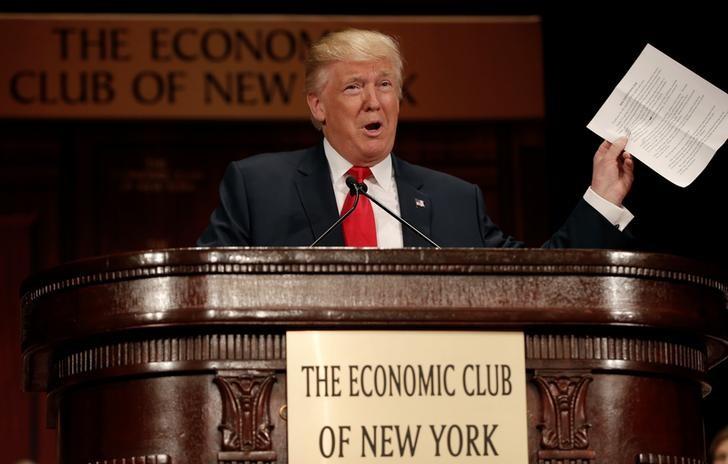Trump doubles down on 'law-and-order' appeal in White House bid
Donald Trump on Thursday praised aggressive police tactics and condemned attacks on officers amid criticism of his plan to use "stop-and-frisk" tactics to reduce crime, in a speech following a second night of unrest that shook Charlotte, North Carolina.
The Republican presidential nominee said drugs were "a very, very big factor" in urban unrest and that those suffering the most from the violence were "law-abiding African-American residents who live in these communities."
"Crime and violence is an attack on the poor and will never be accepted in a Trump administration," Trump told an energy conference in Pittsburgh, as a room full of natural gas and coal industry executives listened in silence.
"The violence against our citizens, and our law enforcement, must be brought to an end," he added.
Trump has portrayed himself as the "law-and-order" candidate. Stop-and-frisk, in which police stop, question and search pedestrians for weapons or contraband, has drawn protests and successful legal challenges because it is seen as unfairly targeting minorities.
At the same time, Trump has recently reached out to African-American voters as the gap in many opinion polls has narrowed between him and his Democratic rival, Hillary Clinton, ahead of the Nov. 8 presidential election.
Clinton, who did not immediately respond to Trump's remarks on Thursday, has pushed for stricter gun controls to help rein in gun violence and called for the development of national guidelines on the use of force by police officers.
In Pittsburgh, Trump, a New York businessman, called for better training of police and more community engagement.
"If you’re not aware, drugs are a very, very big factor in what you’re watching on television at night," Trump said. "My administration will work with local communities and local officials to make the reduction of crime a top priority."
Trump campaign manager Kellyanne Conway said later in a statement that Trump’s comments were not referring “specifically” to the violence in Charlotte, but “addressing a major concern that authorities and moms across the country are raising with him, which is indiscriminate drug use and opiate addiction.”
The fatal police shooting of a black man sparked the protests in Charlotte, and a state of emergency was declared on Wednesday.
There have also been protests in Tulsa, Oklahoma, in recent days after a fatal police shooting of an unarmed black man who a video showed had his hands in clear view at the time. A white Tulsa officer was charged with first-degree manslaughter on Thursday in the shooting.
Police tactics and deadly encounters with African-Americans, many of them unarmed, have sparked protests and unrest across the country in recent years.
Clinton said on Wednesday that the deaths in Charlotte and Tulsa added two more names to the list of African-American victims of police killings. “It’s unbearable, and it needs to become intolerable,” she said.
'THEY'LL TAKE THE GUN AWAY'
Trump was at an African-American church in Cleveland on Wednesday when he praised stop-and-frisk, which had triggered protests and court rulings that it was unconstitutional or required outside monitoring in cities like New York, Chicago and Newark, New Jersey.
Before going to Pittsburgh, Trump was asked on Fox News' "Fox and Friends" program to define the tactic. He said: "If they see a person possibly with a gun or they think may have a gun, they will see the person and they'll look and they'll take the gun away."
"They'll stop, they'll frisk, and they'll take the gun away. And they won't have anything to shoot with," he said.
In Washington, White House spokesman John Earnest pointed to what he said was a contradiction in Trump's remarks.
"It does raise questions that a politician would be so dogmatic about protecting Second Amendment rights (to bear arms) yet rather cavalier about protecting the constitutional prohibition against illegal search and seizure," he told a news briefing.
While Trump did not mention stop-and-frisk by name in Pittsburgh, he used the speech to repeat his praise for the policing tactics fostered by former New York Mayor Rudolph Giuliani, now a major Trump supporter, who promoted the practice. Trump again credited policing under the Republican mayor with reducing crime in the candidate's hometown.
New York City Mayor Bill de Blasio rejected that argument on Thursday, warning Trump against embracing a tactic that would worsen relations between police and the minority community.
De Blasio attributed the sharp drop in crime to another strategy adopted by Bill Bratton, the city's longtime police commissioner, who retired less than a week ago.
Bratton championed the "broken windows" policing strategy that emphasizes pursuit of crimes no matter how minor. In his resignation letter, he attributed the decline in crime in New York, the nation's most populous city with 8.5 million people, to additional officers and an emphasis on building bonds within neighbourhoods.
De Blasio, who supports Clinton, said in an interview with CNN that Trump "should really be careful because if we reinstitute stop-and-frisk all over this country, you would see a lot more tension between police and community."






